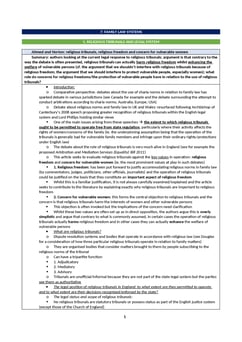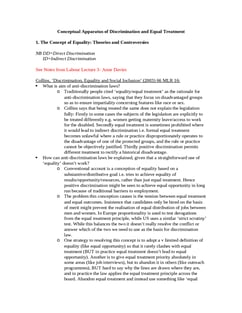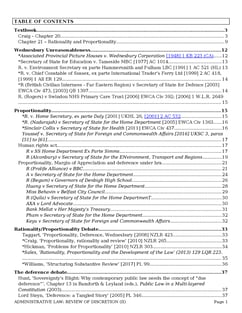Bellinger v Bellinger [2003] UKHL 21
Judgement for the case Bellinger v Bellinger
Table Of Contents
KEY POINTS
During that time, the well-known decision of Ormrod J in Corbett v Corbett [1971] represented the English law addressing the sex of transsexual people. The case involved the gender of a male-to-female transsexual in the context of the legitimacy of a marriage.
Ormrod J ruled that in such a scenario, the law should employ chromosomal, gonadal, and genital tests to determine one's sex. For marriage-related purposes, a person's sex can be determined based on this test. Any surgical intervention ought to be disregarded. An individual's biological sexual makeup is established at birth at the latest and cannot be altered, either naturally or by the use of drugs or surgery, or by the development of organs of the opposite sex.
However, this method disregards "the compelling significance of the person's psychological status as a man or a woman," and since then, there has been a notable shift in social perceptions addressing this issue worldwide.
FACTS
Mrs. Elizabeth Bellinger, a transgender female who was born male and Mr. Michael Bellinger married each other in May 1981.
However, section 11 (c) of the Matrimonial Clauses Act 1973 states that a marriage is null and void unless it is between parties who are male and female.
The issue at hand is whether Mrs. Bellinger was a 'female' at the time of her marriage, as defined by the statute. She seeks a ruling that the marriage was lawful and valid from the outset and is subsisting.
In a separate claim, Mrs. Bellinger also sought a declaration that Section 11 (c) of the Matrimonial Clauses Act 1973 is incompatible with the European Convention on Human Rights, Articles 8 (Right to respect for private and family life, home, and correspondence) and Article 12 (Right to Privacy).
COMMENTARY
The Court declined to issue the declaration, holding that there could be no valid recognition of the marriage because the transsexual female was classified as male, at birth. The court acceded that Mrs. Bellinger and others in comparable situations would not undergo such lengthy and painful surgery unless their mental agony is so acute that they cannot live with themselves otherwise. Non-recognition of their reassignment gender can be quite distressing. The court stated that gender reassignment surgery is being legally recognized internationally.
However, it was held that, recognizing Mrs. Bellinger as female for Section 11 (c) of the Matrimonial Clauses Act, 1973 would involve assigning the terms ‘male’ and ‘female’ in the Act a new, expanded meaning: that a person can be born with one sex but subsequently change, or be considered as, a person of the opposite sex.
The court determined that expanding the meaning of gender in the Act would be a significant shift in the law, with far-reaching consequences. It would highlight issues that necessitate considerable investigation as well as broad public consultation and discussion. Questions of social policy and administrative feasibility would arise, and their interplay must be reviewed and balanced. These concerns are completely unsuitable for resolution through courts and court procedures. They are primarily an issue for the Parliament.
ORIGINAL ANALYSIS
A male to female transsexual who had married as a woman sought a declaration from the courts to the effect that she had contracted a valid marriage.
Under the Matrimonial Causes Act, marriage had to be between a man and a woman, using criteria that prevented gender reassigned individuals, such as the plaintiff, from being recognised as having become a woman.
HL accepted that this was a breach of Plaintiff’s article 8 and 12 rights and granted a s.4 declaration of incompatibility.
Lord Nicholls
He denied that no useful purpose would be served by s.4.
He said that it was appropriate for the house of lords to recognise that the law was incompatible with ECHR at the moment and that it was better to use s.4 than s.3 since the government was planning primary legislation on the matter anyway.
For Further Study on Bellinger v Bellinger

A collection of the best BCL notes the director of Oxbridge Notes (an O...
Need instant answers? Our AI exam tutor is here to help.
Ask questions 🙋 Get answers 📔 It's simple 👁️👄👁️
Our AI is educated by the highest scoring students across all subjects and schools. Join hundreds of your peers today.
Get StartedSimilar Cases
Related Product Samples
These product samples contain the same concepts we cover in this case.
| Children, Families & the State | International Procreation And Parenthood Notes (51 pages) |
| Labour Law | Labour Discrimination Notes (64 pages) |


 Since 2010, Oxbridge Notes has been a trusted education marketplace, supplying high-quality materials from top achievers at universities like Oxford, Cambridge, LSE, Harvard, and Yale.
Since 2010, Oxbridge Notes has been a trusted education marketplace, supplying high-quality materials from top achievers at universities like Oxford, Cambridge, LSE, Harvard, and Yale.